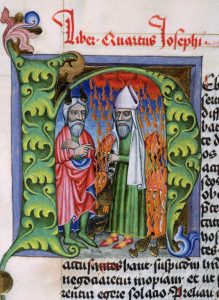Yesterday we explained the background of Korah’s rebellion. The main trigger of the rebellion was the appointment of Elizaphan, the son of Uzziel, to be the chief of the Koathites instead of Korah himself. When reading the scriptures carefully, it seems that Korah and his group of people made a decision to go against Moses and Aaron, who held the leadership and the priesthood roles. Moses, who realized exactly what Korah and his people wanted, noticed that they were talking about TWO different things and that is why Moses divided Korah and his people into TWO groups. The first group is the one from the Levi tribe and they argued AGAINST the priesthood of Aaron and received the following answer from Moses:
“You have gone too far, sons of Levi!” And Moses said to Korah, “Hear now, you sons of Levi: is it too small a thing for you that the God of Israel has separated you from the congregation of Israel, to bring you near to himself, to do service in the tabernacle of the LORD and to stand before the congregation to minister to them, and that he has brought you near him, and all your brothers the sons of Levi with you? And would you seek the priesthood also?” (Numbers 16:5-11)

The second group was the people from the tribe of Reuben – Datan and Abiram the sons of Eliab – who were after the leadership position of Moses, as can be seen in the following verses:
“And Moses sent to call Dathan and Abiram the sons of Eliab, and they said, “We will not come up. Is it a small thing that you have brought us up out of a land flowing with milk and honey, to kill us in the wilderness, that you must also make yourself a prince over us?” (Numbers 16:12-14)
The two key words are ‘Kadosh’ {קדוש} (Hebrew for ‘holy’) for the first group -the Levites – and suggests their service in the Tabernacle. While the second key word is ‘Serarah’ {שררה} (Hebrew for ‘authority’ or ‘rulership’) which was translated to English as ‘prince over us’ and points out the challenge over Moses’ leadership.
